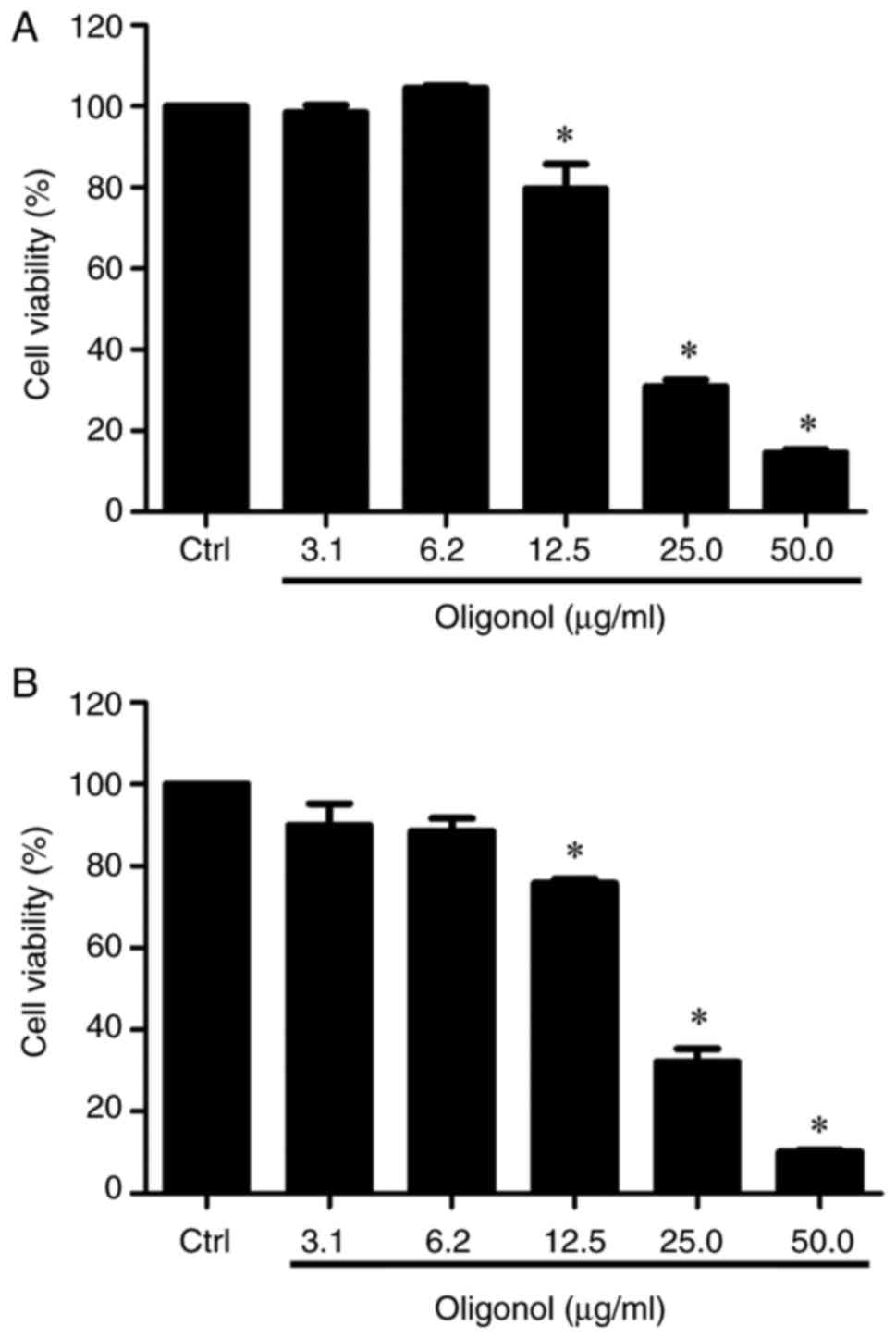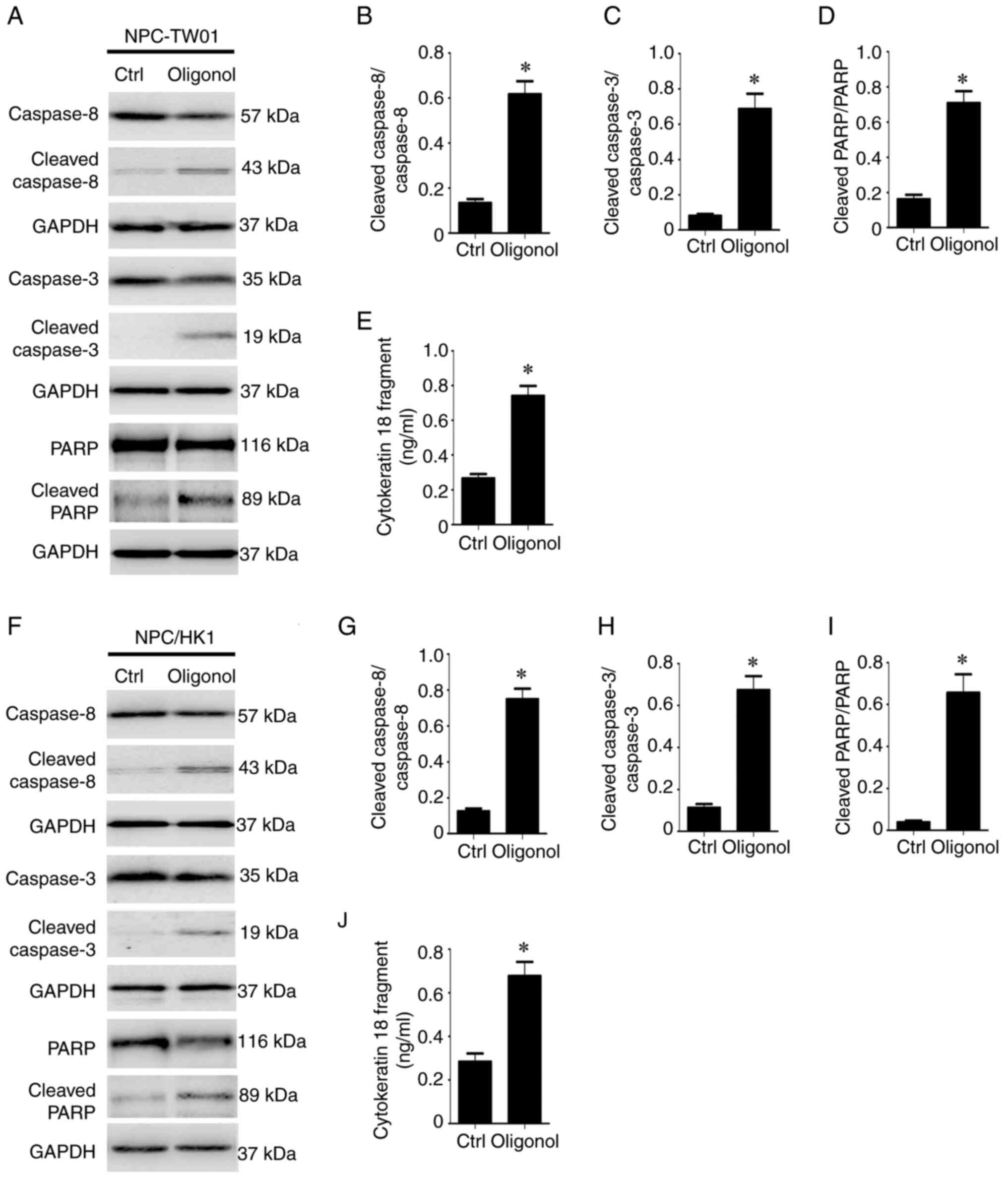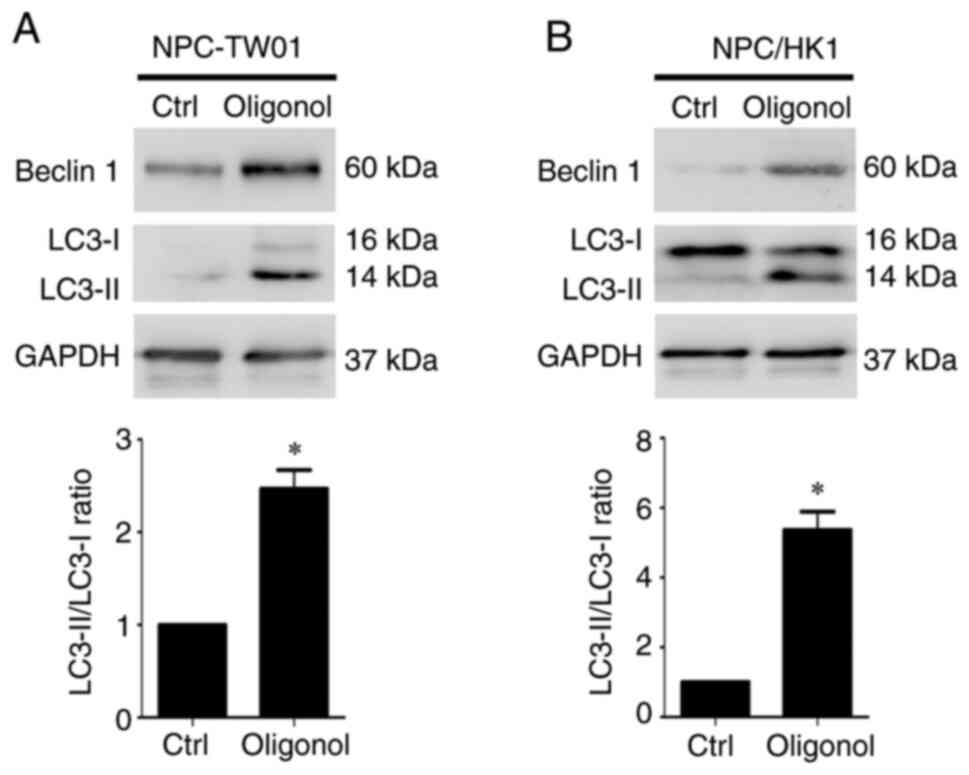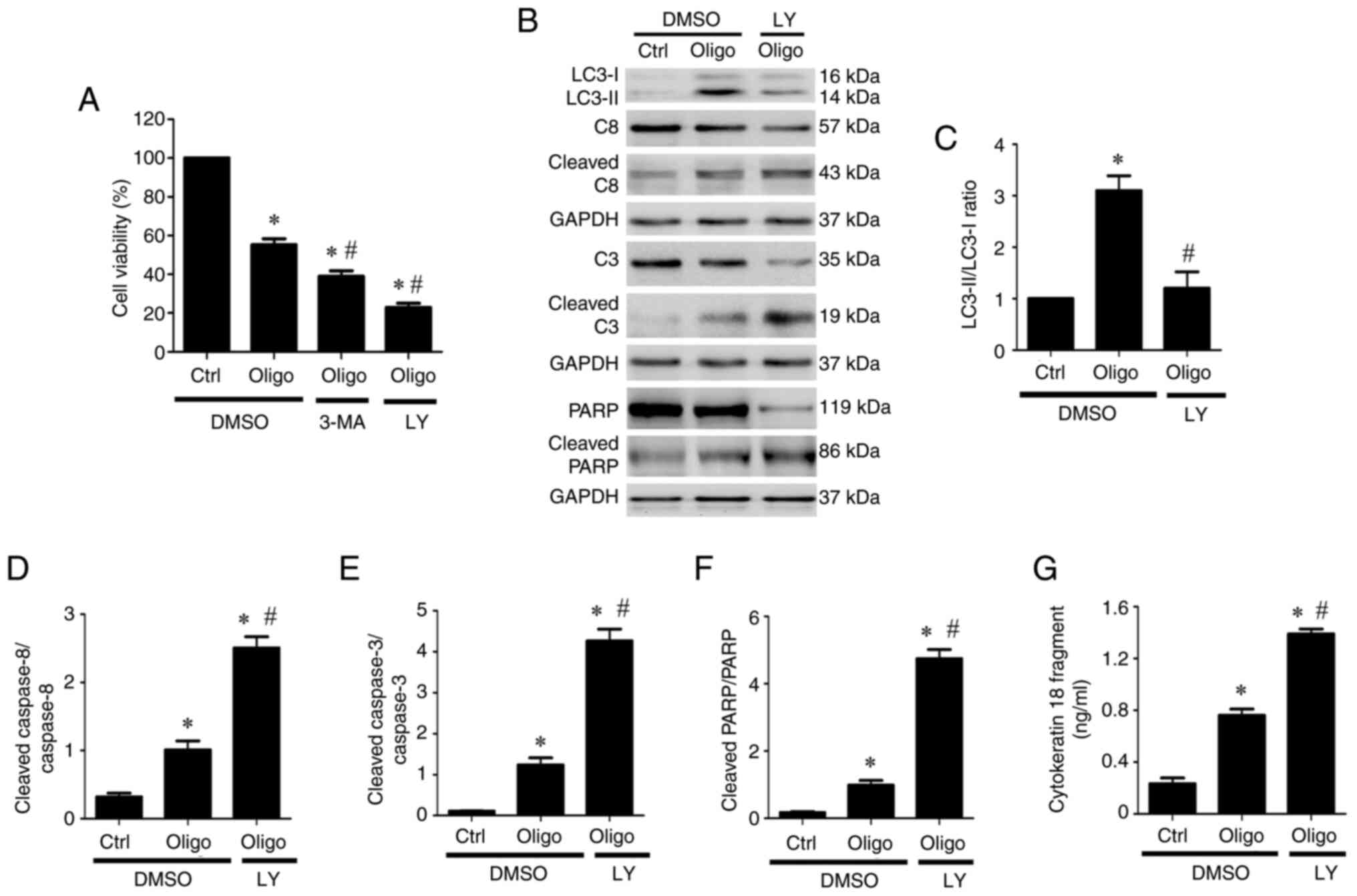|
1
|
Jicman Stan D, Niculet E, Lungu M, Onisor
C, Rebegea L, Vesa D, Bezman L, Bujoreanu FC, Sarbu MI, Mihailov R,
et al: Nasopharyngeal carcinoma: A new synthesis of literature data
(Review). Exp Ther Med. 23(136)2022.PubMed/NCBI View Article : Google Scholar
|
|
2
|
Bai R, Sun J, Xu Y, Sun Z and Zhao X:
Incidence and mortality trends of nasopharynx cancer from 1990 to
2019 in China: An age-period-cohort analysis. BMC Public Health.
22(1351)2022.PubMed/NCBI View Article : Google Scholar
|
|
3
|
Yu H, Yin X, Mao Y, Chen M, Tang Q and Yan
S: The global burden of nasopharyngeal carcinoma from 2009 to 2019:
An observational study based on the Global Burden of Disease Study
2019. Eur Arch Otorhinolaryngol. 279:1519–1533. 2022.PubMed/NCBI View Article : Google Scholar
|
|
4
|
Blanchard P, Lee A, Marguet S, Leclercq J,
Ng WT, Ma J, Chan AT, Huang PY, Benhamou E, Zhu G, et al:
Chemotherapy and radiotherapy in nasopharyngeal carcinoma: An
update of the MAC-NPC meta-analysis. Lancet Oncol. 16:645–655.
2015.PubMed/NCBI View Article : Google Scholar
|
|
5
|
Wu J, Zhou Q, Pan Z, Wang Y, Hu L, Chen G,
Wang S and Lyu J: Development and validation of a nomogram for
predicting long-term overall survival in nasopharyngeal carcinoma:
A population-based study. Medicine (Baltimore).
99(e18974)2020.PubMed/NCBI View Article : Google Scholar
|
|
6
|
Shrihastini V, Muthuramalingam P, Adarshan
S, Sujitha M, Chen JT, Shin H and Ramesh M: Plant derived bioactive
compounds, their anti-cancer effects and in silico approaches as an
alternative target treatment strategy for breast cancer: An updated
overview. Cancers (Basel). 13(6222)2021.PubMed/NCBI View Article : Google Scholar
|
|
7
|
Asma ST, Acaroz U, Imre K, Morar A, Shah
SRA, Hussain SZ, Arslan-Acaroz D, Demirbas H, Hajrulai-Musliu Z,
Istanbullugil FR, et al: Natural Products/Bioactive Compounds as a
Source of Anticancer Drugs. Cancers (Basel).
14(6203)2022.PubMed/NCBI View Article : Google Scholar
|
|
8
|
Yuan M, Zhang G, Bai W, Han X, Li C and
Bian S: The role of bioactive compounds in natural products
extracted from plants in cancer treatment and their mechanisms
related to anticancer effects. Oxid Med Cell Longev.
2022(1429869)2022.PubMed/NCBI View Article : Google Scholar
|
|
9
|
Esmeeta A, Adhikary S, Dharshnaa V,
Swarnamughi P, Ummul Maqsummiya Z, Banerjee A, Pathak S and
Duttaroy AK: Plant-derived bioactive compounds in colon cancer
treatment: An updated review. Biomed Pharmacother.
153(113384)2022.PubMed/NCBI View Article : Google Scholar
|
|
10
|
van Weelden G, Bobinski M, Okla K, van
Weelden WJ, Romano A and Pijnenborg JMA: Fucoidan structure and
activity in relation to anti-cancer mechanisms. Mar Drugs.
17(32)2019.PubMed/NCBI View Article : Google Scholar
|
|
11
|
Su NW, Wu SH, Chi CW, Tsai TH and Chen YJ:
Cordycepin, isolated from medicinal fungus Cordyceps sinensis,
enhances radiosensitivity of oral cancer associated with modulation
of DNA damage repair. Food Chem Toxicol. 124:400–410.
2019.PubMed/NCBI View Article : Google Scholar
|
|
12
|
Xu JC, Zhou XP, Wang XA, Xu MD, Chen T,
Chen TY, Zhou PH and Zhang YQ: Cordycepin induces apoptosis and
G2/M Phase Arrest through the ERK pathways in esophageal cancer
cells. J Cancer. 10:2415–2424. 2019.PubMed/NCBI View Article : Google Scholar
|
|
13
|
Li SZ, Ren JW, Fei J, Zhang XD and Du RL:
Cordycepin induces Bax-dependent apoptosis in colorectal cancer
cells. Mol Med Rep. 19:901–908. 2019.PubMed/NCBI View Article : Google Scholar
|
|
14
|
P A, K A, L S, M M and K M: Anticancer
effect of fucoidan on cell proliferation, cell cycle progression,
genetic damage and apoptotic cell death in HepG2 cancer cells.
Toxicol Rep. 6:556–563. 2019.PubMed/NCBI View Article : Google Scholar
|
|
15
|
Chen X, Sun L, Wei X, Lu H, Tan Y, Sun Z
and Jiang J: Antitumor effect and molecular mechanism of fucoidan
in NSCLC. BMC Complement Med Ther. 21(25)2021.PubMed/NCBI View Article : Google Scholar
|
|
16
|
Endo H, Inoue I, Masunaka K, Tanaka M and
Yano M: Curcumin induces apoptosis in lung cancer cells by 14-3-3
protein-mediated activation of Bad. Biosci Biotechnol Biochem.
84:2440–2447. 2020.PubMed/NCBI View Article : Google Scholar
|
|
17
|
Khan AQ, Ahmed EI, Elareer N, Fathima H,
Prabhu KS, Siveen KS, Kulinski M, Azizi F, Dermime S, Ahmad A, et
al: Curcumin-Mediated apoptotic cell death in papillary thyroid
cancer and cancer stem-like cells through targeting of the
JAK/STAT3 signaling pathway. Int J Mol Sci. 21(438)2020.PubMed/NCBI View Article : Google Scholar
|
|
18
|
Sun Y, Liu L, Wang Y, He A, Hu H, Zhang J,
Han M and Huang Y: Curcumin inhibits the proliferation and invasion
of MG-63 cells through inactivation of the p-JAK2/p-STAT3 pathway.
Onco Targets Ther. 12:2011–2021. 2019.PubMed/NCBI View Article : Google Scholar
|
|
19
|
Kim JY, Cho TJ, Woo BH, Choi KU, Lee CH,
Ryu MH and Park HR: Curcumin-induced autophagy contributes to the
decreased survival of oral cancer cells. Arch Oral Biol.
57:1018–1025. 2012.PubMed/NCBI View Article : Google Scholar
|
|
20
|
Sharifi-Rad J, Quispe C, Patra JK, Singh
YD, Panda MK, Das G, Adetunji CO, Michael OS, Sytar O, Polito L, et
al: Paclitaxel: Application in modern oncology and
nanomedicine-based cancer therapy. Oxid Med Cell Longev.
2021(3687700)2021.PubMed/NCBI View Article : Google Scholar
|
|
21
|
Zhang Y, Chen X, Gueydan C and Han J:
Plasma membrane changes during programmed cell deaths. Cell Res.
28:9–21. 2018.PubMed/NCBI View Article : Google Scholar
|
|
22
|
Ulukaya E, Karaagac E, Ari F, Oral AY,
Adim SB, Tokullugil AH and Evrensel T: Chemotherapy increases
caspase-cleaved cytokeratin 18 in the serum of breast cancer
patients. Radiol Oncol. 45:116–122. 2011.PubMed/NCBI View Article : Google Scholar
|
|
23
|
Carneiro BA and El-Deiry WS: Targeting
apoptosis in cancer therapy. Nat Rev Clin Oncol. 17:395–417.
2020.PubMed/NCBI View Article : Google Scholar
|
|
24
|
Khandia R, Dadar M, Munjal A, Dhama K,
Karthik K, Tiwari R, Yatoo MI, Iqbal HMN, Singh KP, Joshi SK and
Chaicumpa W: A comprehensive review of autophagy and its various
roles in infectious, non-infectious, and lifestyle diseases:
Current knowledge and prospects for disease prevention, novel drug
design, and therapy. Cells. 8(674)2019.PubMed/NCBI View Article : Google Scholar
|
|
25
|
Wirth M, Joachim J and Tooze SA:
Autophagosome formation-the role of ULK1 and Beclin1-PI3KC3
complexes in setting the stage. Semin Cancer Biol. 23:301–309.
2013.PubMed/NCBI View Article : Google Scholar
|
|
26
|
Zhang T, Yu J, Cheng S, Zhang Y, Zhou CH,
Qin J and Luo H: Research progress on the anticancer molecular
mechanism of targets regulating cell autophagy. Pharmacology.
108:224–237. 2023.PubMed/NCBI View Article : Google Scholar
|
|
27
|
Sun Y, Yao X, Zhang QJ, Zhu M, Liu ZP, Ci
B, Xie Y, Carlson D, Rothermel BA, Sun Y, et al: Beclin-1-Dependent
autophagy protects the heart during sepsis. Circulation.
138:2247–2262. 2018.PubMed/NCBI View Article : Google Scholar
|
|
28
|
Hamurcu Z, Delibasi N, Gecene S, Şener EF,
Dönmez-Altuntaş H, Özkul Y, Canatan H and Ozpolat B: Targeting LC3
and Beclin-1 autophagy genes suppresses proliferation, survival,
migration and invasion by inhibition of Cyclin-D1 and uPAR/Integrin
β1/Src signaling in triple negative breast cancer cells. J Cancer
Res Clin Oncol. 144:415–430. 2018.PubMed/NCBI View Article : Google Scholar
|
|
29
|
Chen J, Zhang L, Zhou H, Wang W, Luo Y,
Yang H and Yi H: Inhibition of autophagy promotes cisplatin-induced
apoptotic cell death through Atg5 and Beclin 1 in A549 human lung
cancer cells. Mol Med Rep. 17:6859–6865. 2018.PubMed/NCBI View Article : Google Scholar
|
|
30
|
Li W, Zhou Y, Yang J, Li H, Zhang H and
Zheng P: Curcumin induces apoptotic cell death and protective
autophagy in human gastric cancer cells. Oncol Rep. 37:3459–3466.
2017.PubMed/NCBI View Article : Google Scholar
|
|
31
|
Fujii H, Sun B, Nishioka H, Hirose A and
Aruoma OI: Evaluation of the safety and toxicity of the
oligomerized polyphenol Oligonol. Food Chem Toxicol. 45:378–387.
2007.PubMed/NCBI View Article : Google Scholar
|
|
32
|
Sakurai T, Nishioka H, Fujii H, Nakano N,
Kizaki T, Radak Z, Izawa T, Haga S and Ohno H: Antioxidative
effects of a new lychee fruit-derived polyphenol mixture, oligonol,
converted into a low-molecular form in adipocytes. Biosci
Biotechnol Biochem. 72:463–476. 2008.PubMed/NCBI View Article : Google Scholar
|
|
33
|
Lee C, Bak J, Yoon S and Moon JO:
Protective effect of oligonol on dimethylnitrosamine-induced liver
fibrosis in rats via the JNK/NF-κB and PI3K/Akt/Nrf2 signaling
pathways. Antioxidants (Basel). 10(366)2021.PubMed/NCBI View Article : Google Scholar
|
|
34
|
Chang YC, Chen YT, Liu HW, Chan YC, Liu
MY, Hu SH, Tseng WT, Wu HL, Wang MF and Chang SJ: Oligonol
alleviates sarcopenia by regulation of signaling pathways involved
in protein turnover and mitochondrial quality. Mol Nutr Food Res.
63(e1801102)2019.PubMed/NCBI View Article : Google Scholar
|
|
35
|
Jo EH, Lee SJ, Ahn NS, Park JS, Hwang JW,
Kim SH, Aruoma OI, Lee YS and Kang KS: Induction of apoptosis in
MCF-7 and MDA-MB-231 breast cancer cells by Oligonol is mediated by
Bcl-2 family regulation and MEK/ERK signaling. Eur J Cancer Prev.
16:342–347. 2007.PubMed/NCBI View Article : Google Scholar
|
|
36
|
Kim M, Park WH, Lee S, Suh DH, Kim K, No
JH and Kim YB: Oligonol, a low molecular weight polyphenol,
enhances apoptotic cell death in ovarian cancer cells via
suppressing NF-κB activation. Nutr Cancer. 71:141–148.
2019.PubMed/NCBI View Article : Google Scholar
|
|
37
|
Aimjongjun S, Mahmud Z, Jiramongkol Y,
Alasiri G, Yao S, Yagüe E, Janvilisri T and Lam EW: Lapatinib
sensitivity in nasopharyngeal carcinoma is modulated by
SIRT2-mediated FOXO3 deacetylation. BMC Cancer.
19(1106)2019.PubMed/NCBI View Article : Google Scholar
|
|
38
|
Huang DP, Ho JH, Poon YF, Chew EC, Saw D,
Lui M, Li CL, Mak LS, Lai SH and Lau WH: Establishment of a cell
line (NPC/HK1) from a differentiated squamous carcinoma of the
nasopharynx. Int J Cancer. 26:127–132. 1980.PubMed/NCBI View Article : Google Scholar
|
|
39
|
Li Y, Li R, Zhu S, Zhou R, Wang L, DU J,
Wang Y, Zhou B and Mai L: Cordycepin induces apoptosis and
autophagy in human neuroblastoma SK-N-SH and BE(2)-M17 cells. Oncol
Lett. 9:2541–2547. 2015.PubMed/NCBI View Article : Google Scholar
|
|
40
|
Gong X, Jiang L, Li W, Liang Q and Li Z:
Curcumin induces apoptosis and autophagy inhuman renal cell
carcinoma cells via Akt/mTOR suppression. Bioengineered.
12:5017–5027. 2021.PubMed/NCBI View Article : Google Scholar
|
|
41
|
Fang S, Wan X, Zou X, Sun S, Hao X, Liang
C, Zhang Z, Zhang F, Sun B, Li H and Yu B: Arsenic trioxide induces
macrophage autophagy and atheroprotection by regulating
ROS-dependent TFEB nuclear translocation and AKT/mTOR pathway. Cell
Death Dis. 12(88)2021.PubMed/NCBI View Article : Google Scholar
|
|
42
|
Wang CY, Tsai SW, Chien HH, Chen TY, Sheu
SY, So EC and Huang BM: Cordycepin inhibits human gestational
choriocarcinoma cell growth by disrupting centrosome homeostasis.
Drug Des Devel Ther. 14:2987–3000. 2020.PubMed/NCBI View Article : Google Scholar
|
|
43
|
Jiang Y, Ji F, Liu Y, He M, Zhang Z, Yang
J, Wang N, Zhong C, Jin Q, Ye X and Chen T: Cisplatin-induced
autophagy protects breast cancer cells from apoptosis by regulating
yes-associated protein. Oncol Rep. 38:3668–3676. 2017.PubMed/NCBI View Article : Google Scholar
|
|
44
|
Liu S and Li X: Autophagy inhibition
enhances sensitivity of endometrial carcinoma cells to paclitaxel.
Int J Oncol. 46:2399–2408. 2015.PubMed/NCBI View Article : Google Scholar
|
|
45
|
Pasquier B: Autophagy inhibitors. Cell Mol
Life Sci. 73:985–1001. 2016.PubMed/NCBI View Article : Google Scholar
|
|
46
|
Pan X, Zhang X, Sun H, Zhang J, Yan M and
Zhang H: Autophagy inhibition promotes 5-fluorouraci-induced
apoptosis by stimulating ROS formation in human non-small cell lung
cancer A549 cells. PLoS One. 8(e56679)2013.PubMed/NCBI View Article : Google Scholar
|
|
47
|
Sayed D, He M, Hong C, Gao S, Rane S, Yang
Z and Abdellatif M: MicroRNA-21 is a downstream effector of AKT
that mediates its antiapoptotic effects via suppression of Fas
ligand. J Biol Chem. 285:20281–20290. 2010.PubMed/NCBI View Article : Google Scholar
|
|
48
|
Tsai MC, Chen CC, Tseng TH, Chang YC, Lin
YJ, Tsai IN, Wang CC and Wang CJ: Hibiscus anthocyanins extracts
induce apoptosis by activating AMP-Activated protein kinase in
human colorectal cancer cells. Nutrients. 15(3972)2023.PubMed/NCBI View Article : Google Scholar
|
|
49
|
Park JY, Kim Y, Im JA, You S and Lee H:
Inhibition of adipogenesis by oligonol through Akt-mTOR inhibition
in 3T3-L1 adipocytes. Evid Based Complement Alternat Med.
2014(895272)2014.PubMed/NCBI View Article : Google Scholar
|
|
50
|
Park SK, Seong RK, Kim JA, Son SJ, Kim Y,
Yokozawa T and Shin OS: Oligonol promotes anti-aging pathways via
modulation of SIRT1-AMPK-Autophagy pathway. Nutr Res Pract.
10:3–10. 2016.PubMed/NCBI View Article : Google Scholar
|
|
51
|
Bata N and Cosford NDP: Cell survival and
cell death at the intersection of autophagy and apoptosis:
Implications for current and future cancer therapeutics. ACS
Pharmacol Transl Sci. 4:1728–1746. 2021.PubMed/NCBI View Article : Google Scholar
|
|
52
|
Gomes LC, Di Benedetto G and Scorrano L:
During autophagy mitochondria elongate, are spared from degradation
and sustain cell viability. Nat Cell Biol. 13:589–598.
2011.PubMed/NCBI View Article : Google Scholar
|
|
53
|
Pan J, Xu G and Yeung SC: Cytochrome c
release is upstream to activation of caspase-9, caspase-8, and
caspase-3 in the enhanced apoptosis of anaplastic thyroid cancer
cells induced by manumycin and paclitaxel. J Clin Endocrinol Metab.
86:4731–4740. 2001.PubMed/NCBI View Article : Google Scholar
|
|
54
|
Hou W, Han J, Lu C, Goldstein LA and
Rabinowich H: Autophagic degradation of active caspase-8: A
crosstalk mechanism between autophagy and apoptosis. Autophagy.
6:891–900. 2010.PubMed/NCBI View Article : Google Scholar
|


















